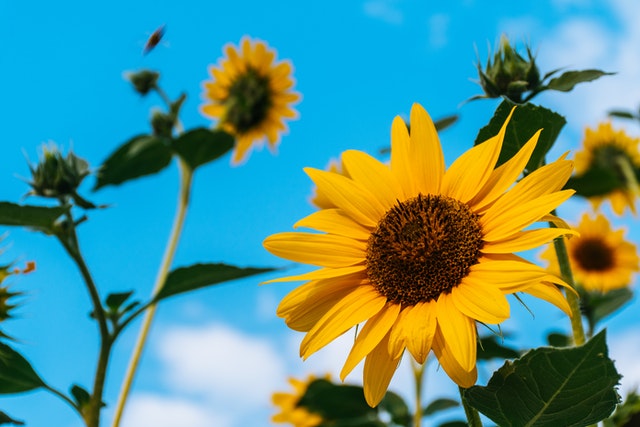
Understanding Sunflowers: Origins, Meanings, and Symbolisms

Sunflowers are the type of flowers that can make you smile at a single glance. With their undeniable beauty, sunflowers exude so much happiness in their bright yellow colors. Ultimately, it’s why people can’t resist purchasing bouquets filled with hydrangea and sunflowers.
However, sunflowers are not just for show. They come from beautiful origins, maintain a cultural significance, and come with meanings behind them. Do you want to learn more about beautiful sunflowers bouquets? Keep on reading to find out.
The Origins of a Sunflower’s Name
Sunflowers, scientifically known as Helianthus annuus, are famous for their bright yellow petals, and it’s easy to think that the flower’s resemblance to the sun gave it this name. Here’s something interesting: the meaning extends to its scientific name.
The genus name of the sunflower, Helianthus, is a combination of two Greek words: “helios” for “sun” and “anthos” for “flower”. Though it literally means sunflower, it’s not named after the appearance. Instead, the sunflower got its name from the plant’s amusing ability to face and follow the sun.
Moreover, sunflowers are annual plants, which means they live for only one year. That characteristic gave the species name annuus.
The Cultural Significance of Sunflowers
Just like the sun, sunflowers were also used to form patterns and to tell stories. As it turns out, sunflowers were used for religious purposes for thousands of years. Here are some ways sunflowers influenced civilizations.
1. Ancient Greeks
In Greek mythology, the story of Apollo and Clytie also tells the story of sunflowers and why they turn toward the sun.
Apollo, the sun god, caught the eyes of Clytie, a water nymph. She followed Clytie as he traveled through the sky, even when Apollo barely noticed. She spent all of her days gazing through the sky, refusing to eat and only drinking dew.
Eventually, the gods took pity on her, turning her into a sunflower to free her from pain. Even though she’s a plant, part of her stilled remained, which gave the flower the characteristic of tracking the sun.
2. Chinese
Sunflowers serve as a symbol of good luck and vitality for the Chinese. In Chinese culture, giving sunflowers are given to wish someone a long life, happiness, and a healthy year.
3. Native American
Sunflowers were also very popular in the Native American civilizations. The Native Americans used the sunflower’s petals to make baskets, clothes, and headdresses. They also used them in ceremonies and celebrations, as sunflowers signified prosperity and bountiful harvest.
The Meanings and Symbolisms
Sunflowers are associated with numerous meanings. Some of them include:
1. Good Luck
Sunflowers are considered to be lucky flowers. In fact, the phrase “bringing a sunflower to your front door” is used in many parts of the world to mean that someone is lucky.
2. Happiness
The bright yellow shade of sunflowers can easily put a smile on your face. Sunflowers are no doubt a great way to bring joy to the people in your life.
3. Abundance
Sunflowers are also a symbol of abundance, as the sun symbolizes life, life is the result of abundance, and abundance is what grows from life.
4. Pride
Sunflowers are also known to represent people’s pride. They are often used in celebrations for the birth of babies, weddings, and anniversaries because sunflowers signify love and unity.
5. Faith
Some people use sunflowers in their gardens as a way to let their faith shine through in their homes. According to these people, sunflowers can bring peace and good fortune to their homes.
Final Thoughts
Sunflowers are thoughtful gifts, and they are also one of the easiest and most popular plants to grow. You can give sunflowers as gifts to friends and loved ones or even as an expression of your love and affection.
Give your loved one some sunflowers by shopping at April Flora, the best Bangkok florist. We offer same-day flower delivery in Bangkok, free delivery, and 100% satisfaction guaranteed. Explore the rest of our site today or call us at +66 61 824 0108 for more information.


